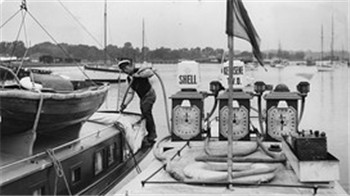(单词翻译:单击)

In 2001, while interviewing executives at Nokia, I was introduced to the Finnish word. It meant humility, I was told, but humility with a quiet self-assurance. That self-assurance seemed well-deserved. Nokiawas then the giant of the mobile phone world, controlling 35 per cent of the global market.
2001年,在采访诺基亚(Nokia)高管时,有人跟我提到了一个芬兰词 。 有人告诉我,它的意思是谦逊,是带着默默自信的谦逊。这种自信似乎当之无愧。诺基亚当时是全球手机行业的巨擘,控制着全球手机市场35%的份额。
Could it last, I asked in the articles I wrote at the time. We now know that it did not. After being eclipsed by Apple’s iPhone and by Android-based Asian handsets, Nokia last year handed over its much-weakened mobile phone business to Microsoft. But Nokia has not disappeared. It is now a mobile networks operation, has a digital mapping business and owns a host of patents.
我在当时写的文章中问道,它能长期屹立不倒吗?我们现在知道,它不能。在被苹果(Apple)的iPhone和基于安卓(Android)系统的亚洲手机夺去光彩后,诺基亚去年将其实力大大减弱的手机业务售予微软(Microsoft)。但诺基亚没有消失。它现在经营着移动网络业务,拥有数字地图业务和很多专利。
Reinventing itself is not new to Nokia. It has done so repeatedly since it began life in 1865 as a paper manufacturer. It has since been a maker of rubber boots, raincoats, cables and television sets. It has been an electricity generator, was once Ireland’s leading producer of toilet paper and the world’s only supplier of studded bicycle tyres.
重塑自身对于诺基亚并不新鲜。自从1865年作为一家造纸商创建以来,它曾多次这么做过。之后诺基亚生产过橡胶靴、雨衣、电缆和电视机。诺基亚做过发电商,曾经是爱尔兰主要卫生纸制造商,也曾是全球自行车防滑钉轮胎的唯一供应商。
This is unusual. Few companies change their businesses as dramatically and only a minority last as long. In an influential book, The Living Company, first published in 1997, Arie de Geus asked why some companies endured while others died young. The average multinational company lasted less than 50 years, but some, such as Nokia, were well over 100 years old.Royal Dutch Shell, where Mr de Geus worked for 38 years, began in 1833. A few had been around for centuries, he wrote. The Sumitomo Group of Japan could trace its origins to a copper casting shop founded in 1590.
这不同寻常。很少有企业会进行如此剧烈的业务转型,而且只有少数能够存活这么长时间。在1997年首次出版的颇具影响力的《长寿公司》(The Living Company)中,阿里德赫斯(Arie de Geus)问道,为什么一些公司可以长寿,另一些公司却英年早逝。跨国企业的平均寿命不到50年,但诺基亚等一些公司的历史却远远超过了100年。德赫斯为之工作了38年的荷兰皇家壳牌(Royal Dutch Shell)是在1833年创建的。他写道,很少有企业会存活几个世纪之久。日本住友集团(Sumitomo Group)的起源可以追溯到1590年创建的一家铸铜店。
In no other type of organisation, whether universities, armies or churches, was there such a disparity between the shortest and longest-living institutions.
其他任何类型的组织(不管是大学、军队还是教堂),寿命最长和最短者之间都不会出现如此巨大的差异。
Does it matter whether companies live centuries or not? Is not the death of companies and the birth of new ones the way economies and societies progress – through what Joseph Schumpeter called “creative destruction”?
公司能否存活数个世纪是否重要?老公司的灭亡和新公司的诞生,不是经济和社会通过约瑟夫訠籱祟(Joseph Schumpeter)所称的“创造性破坏”进步的方式吗?
Yes. Companies can become complacent, as Nokia was about the arrival of the smartphone. Many are replaced by quicker, more alert competitors. But Mr de Geus and others have argued that long-living companies perform a valuable role.
是的。公司可能会变得自满,诺基亚对于智能手机的出现的态度就是如此。很多公司被行动更迅速且更警觉的竞争对手取代。但德赫斯和其他一些人认为,长寿公司发挥着重要作用。
They lay down roots. They establish links with communities, provide employment and memories to successive generations of workers and act as an important social glue. As families have become more fragmented and people more mobile, long-living companies provide a sense of cohesion and communal solidarity.
它们会扎下根基。它们与社会建立联系、为一代代员工提供就业和回忆,同时充当一种重要的社会粘合剂。在家庭变得更为分散且人们的流动性变得更强之际,长寿公司提供了一种凝聚感和社会团结感。
When they die, neighbourhoods are often left desolate, longstanding suppliers lose business and former employees and their families are deprived of their workday memories.
当这些公司灭亡时,临近的社区通常会变得荒凉起来,长期供应商会丢掉业务,以前的员工和他们的家人会丧失他们对于工作的回忆。
So why do some companies manage to last so long?
那么,为什么一些公司能够存活很长时间呢?
In his book, Mr de Geus pointed to four characteristics of long-lived companies. First, they were sensitive to changes in the business environment and in their societies. Second, they had a strong sense of identity. Third, they were “tolerant”, by which he meant that they were not over-centralised and allowed experiments and eccentricities among their staff. Finally, they were conservative in their financing – “they knew the usefulness of having spare cash in the kitty”.
德赫斯在书中指出了长寿公司的4个特点。第一,它们对商业环境和所处社会的变化相当敏感。第二,它们有强烈的认同感。第三,它们“宽容”,他的意思是它们并不过分集权,允许员工试验和特立独行。最后,它们在融资方面相当保守,“它们知道留有备用现金的用处。”
There are other questions we can ask.
我们还可以提出其他问题。
Is ownership important? Some companies survive because they are family-owned, educating each new generation to take a role and become executives. But family ownership is no panacea. It is difficult to instil hunger for success, hard work and managerial savvy in successive generations. And not all of the oldest companies are family-owned.
所有权是否重要?一些公司存活下来的原因是它们由家族所有,他们会教育新一代人承担角色并成为高管。但家族所有权并非万能药。很难将成功的渴望、勤奋和管理头脑连续植入几代人。而且并非所有历史最长的公司都由家族所有。
Does the industry matter? Is it easier to survive in the resources business, say in mining, than in the tech industry? It is difficult to judge. The technology industry is too young for us to know whether, for example, Apple, Microsoft or Facebook are going to show real staying power. Certainly, companies that were once big names in technology – Wang and ICL, for example – are no longer around.
行业是否重要?在资源行业(例如矿业)是否要比在科技行业更容易存活?现在很难判断。科技行业还太年轻,我们无法了解苹果、微软或Facebook是否会展示出真正的持久力。当然,科技行业那些曾经的巨擘(例如,Wang和ICL)都已消失。
And, most important, can large companies keep innovating or are they inevitably undermined by new arrivals with smaller bureaucracies, no pension liabilities and less of an investment in older technologies and ways of operating?
最重要的是,大公司能否保持创新,或者是否会不可避免地受到新公司的削弱?新公司官僚主义较少、没有养老金义务,而且在较老的技术和经营方式方面投资较少。
Over the next few months, the Financial Times (which itself is 127 years old) will be examining what helps some companies last so long – and how they can fend off decline. We will be running events and broadcasting videos from the leading business cities on four continents: Hong Kong, Johannesburg, New York and London.
未来几个月,英国《金融时报》(本身有127年历史)将考察是什么帮助一些公司存活那么长时间,以及它们是如何抵御衰落的。我们将举办各种活动,并播放来自位于四个大陆的领先商业城市的视频:香港、约翰内斯堡、纽约和伦敦。
Each of these financial and commercial centres has companies that have been around for decades or centuries, as well as thriving start-ups. We will be interviewing executives from both types of companies, as well as academic experts.
这些金融和商业中心都拥有具有几十年或几百年历史的企业以及蓬勃发展的初创企业。我们将采访这两类企业的高管和学术专家。
But we also want to hear from you, the FT reader. Do you think long-living companies are valuable to our societies and, if so, what do you think helps them endure? Do you work or for a company that has been around forever, or do you work for a recent corporate arrival – or perhaps you have worked for both? How do you think the most successful older companies have done it? Please join in the debate by posting your thoughts here or follow #FTLongevity.on Twitter.
但英国《金融时报》的读者,我们也希望听到你的看法。你是否认为长寿公司对我们的社会很重要?如果是的话,你认为它们长寿的秘诀是什么?你是在为一家历史悠久的公司工作,还是在为一家最近才诞生的公司工作,或者你曾经为两种公司都工作过?你认为最成功的历史较长的公司是如何做到的?请加入我们的辩论,在这里提出你的看法,或者在Twitter上关注#FTLongevity。


